
-
Find the right food for your petTake this quiz to see which food may be the best for your furry friend.Find the right food for your petTake this quiz to see which food may be the best for your furry friend.Featured products
 Sensitive Stomach & Skin Dog Food
Sensitive Stomach & Skin Dog FoodHill's Science Plan Sensitive Stomach & Skin Adult Wet Dog Food with Chicken is a complete premium dog food for adult dogs from 1 year. This savoury tinned loaf is enriched with ingredients that support digestive health & skin care.
Shop Now Perfect Digestion Small & Mini Adult Dog Food
Perfect Digestion Small & Mini Adult Dog FoodHill's Science Plan Perfect Digestion Small & Mini Adult Dog Food with Turkey is a complete premium pet food for small breed adult dogs aged 1–6 years. This deliciously smooth mousse is precisely balanced to deliver the appropriate amount of energy and to support digestive health in adult, small breed dogs.
Shop Now Perfect Weight Small & Mini Adult Dog Food
Perfect Weight Small & Mini Adult Dog FoodHill's Science Plan Adult Small & Mini Dog Food with Turkey is a complete premium pet food for adult small dogs from 1 year old that are prone to weight gain or slightly overweight. This deliciously smooth mousse is formulated to deliver the appropriate amount of energy to support weight maintenance in adult dogs.
Shop NowFeatured products Sensitive Stomach & Skin Adult Cat Food
Sensitive Stomach & Skin Adult Cat FoodHill's Science Plan Adult Sensitive Stomach & Skin Cat Premium Chunks in Sauce with Turkey is a complete pet food for adult cats aged 1-6 years
Shop Now Hairball & Perfect Coat Adult Dry Cat Food with Chicken
Hairball & Perfect Coat Adult Dry Cat Food with ChickenHill's Science Plan Hairball & Perfect Coat Adult Cat Food with Chicken is formulated to effectively help avoid hairball formation in adult cats while promoting a beautiful coat. Thanks to its mix of essential omega-6 fatty acids, this food benefits the cat's skin and fur, keeping them healthy and shiny. Our Advanced Fibre Technology helps reduce hairballs by naturally promoting their passage through the gut. This food is formulated with high-quality protein for a perfectly balanced, great-tasting recipe.
Shop Now Sterilised Adult Cat Food
Sterilised Adult Cat FoodHill's Science Plan Adult Sterilised Cat Dry Food with Salmon is specially formulated with ActivBiome+ Multi-Benefit Technology. It is a precisely balanced nutrition, tailored to meet the needs of sterilised cats, to help keep them lean & healthy.
Shop Now -
Dog
- Dog Tips & Articles
-
Health Category
- Weight
- Food & Environmental Sensitivities
- Urinary
- Digestive
- Joint
- Kidney
-
Life Stage
- Puppy Nutrition
- Adult Nutrition
- Senior Nutrition
Cat- Cat Tips & Articles
-
Health Category
- Weight
- Skin & Food Sensitivities
- Urinary
- Digestive
- Kidney
-
Life Stage
- Kitten Nutrition
- Adult Nutrition
Featured articles Tips For Mixing Wet And Dry Pet Food
Tips For Mixing Wet And Dry Pet FoodDiscover tips for mixing wet and dry pet food to ensure balanced nutrition and variety for your pet. For comprehensive feeding advice, visit Hill's Pet UK.
Read More Virtual Vet Visits: What You Need to Know
Virtual Vet Visits: What You Need to KnowLearn the ins and outs of a televet appointment before you talk to a vet online.
Read More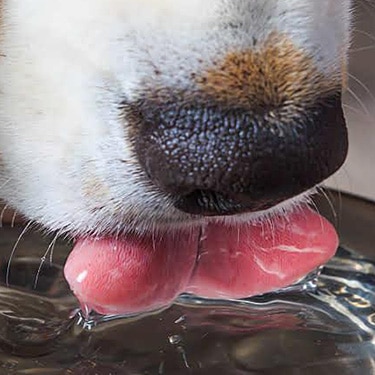 An Owner's Guide To Safe Water Sources For Pets
An Owner's Guide To Safe Water Sources For PetsEnsure your pet's hydration with our owner's guide to safe water sources for pets. For detailed tips on maintaining your pet's health, visit Hill's Pet UK.
Read More -


Sneezing is an important bodily function that kittens, cats, humans and pretty much all mammals rely on to get unwanted things out of their nose! The inside of the nose is very sensitive and acts as a filter to avoid potentially hazardous things getting into the windpipe and lungs. So, sneezing, like many things in life, is good in moderation! However, there are times that excessive sneezing may be a sign of ill health or other problems, such as a foreign object lodged in the nose. Let’s take a look at the main causes of sneezing and when you should get help.
What is making my kitten sneeze?
Cats are incredibly sensitive to smell and use this sense much more than we humans do. The sense of smell in cats is also very strongly linked to appetite. Kittens love to explore and will be constantly sniffing their environment and all the nooks and crannies they can get into. This means they’ll come into contact with lots of things that can make them sneeze, such as:
Dust. No matter how clean your house is, small kittens will find dusty places.
Cat litter. Some brands of cat litter are very dusty and this can be quite overwhelming for a sensitive little nose.
Perfume, scented candles and cleaning products. Smells that we find pleasant and use on a daily basis can be very overpowering for animals that are as sensitive to smell as kittens. Try to avoid these powerful odours if possible.
Cigarette smoke. Secondhand smoking is as harmful for our pets as it is for the other humans around you. Please don’t smoke around your pets.
Pollen and mould.
Foreign bodies. Cats, especially kittens, have very small noses but things can still get lodged in there. One of the most common problems is a blade of grass that gets accidentally inhaled while exploring the garden or grazing, as cats like to do occasionally. This is very irritating and will usually cause very sudden, frequent sneezing. Your kitten may also paw at their face or shake their head.


Tasty Tips
As well as physical things that can irritate the nose, there are medical issues that can too:
Viral infections. Kittens rely on immunity from their mums in the early stages of life, so if their mum isn’t vaccinated they may be vulnerable to infection. Also, kittens often come from breeding establishments or shelters with multiple cats, so they may be exposed to more illnesses or a higher load of virus.
Bacterial infections such as chlamydia.
Tumours in the nose are very rare in kittens, but can be a cause of sneezing.
When should you worry?
As we said, sneezing can be a very good thing and is a totally normal body function, so occasional sneezing is nothing to worry about. If it seems frequent, see if you can associate it with something avoidable, such as a certain smelly product, or when they’ve just been in the litter tray. You may be able to eliminate the source of irritation quite easily.
However, if your kitten is unwell, and especially if they go off their food, they can become ill and debilitated very quickly due to their small size. Always seek veterinary advice for sneezing if your kitten:
Stops eating or eats less than normal.
Becomes depressed and doesn’t want to play.
Has swollen or red eyes.
Has any eye or nasal discharge.
Is pawing at their face or head-shaking.
Is sneezing all the time or in frequent bouts.
Looks in poor condition.
Coughs.
Has other problems such as diarrhoea.
Remember to talk to your vet about vaccinations, preventative healthcare and good nutrition, and take your kitten for the checks recommended by your vet. This way, you can make sure they are growing well and are happy as well as healthy.
Reviewed by Dr. Hein Meyer, DVM, PhD, Dipl-ECVIM-CA


Sarah Whitehead is a renowned Certified Clinical Animal Behaviourist based in the UK, with a deep passion for unlocking the secrets of animal behaviour. With expertise in both dogs and cats, Sarah is dedicated to helping pet parents decode the subtle language of body cues and behaviour. She believes that training and play are powerful tools not only for improving communication but for building lasting, meaningful connections between humans and their canine and feline companions. Sarah’s approach combines science with compassion, offering a fresh perspective on how to enrich the lives of our pets and deepen the bond we share with them.
Related products

Hill's Science Plan Hairball & Perfect Coat Adult Cat Food with Chicken is formulated to effectively help avoid hairball formation in adult cats while promoting a beautiful coat. Thanks to its mix of essential omega-6 fatty acids, this food benefits the cat's skin and fur, keeping them healthy and shiny. Our Advanced Fibre Technology helps reduce hairballs by naturally promoting their passage through the gut. This food is formulated with high-quality protein for a perfectly balanced, great-tasting recipe.

Hill's Science Plan Adult Sterilised Cat Dry Food with Salmon is specially formulated with ActivBiome+ Multi-Benefit Technology. It is a precisely balanced nutrition, tailored to meet the needs of sterilised cats, to help keep them lean & healthy.

Hill's Science Plan Adult Sensitive Stomach & Skin Cat Premium Chunks in Sauce with Turkey is a complete pet food for adult cats aged 1-6 years
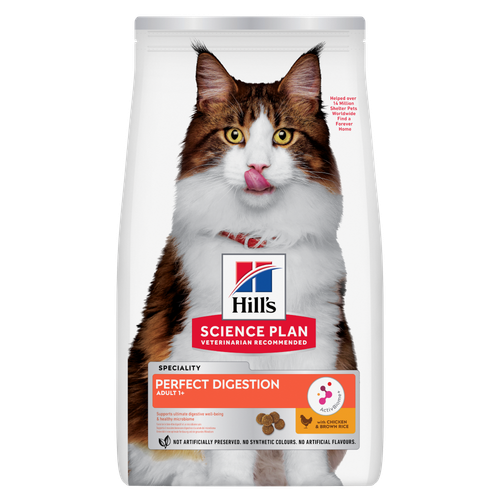
Hill's Science Plan Perfect Digestion Cat Food with Chicken & Brown Rice nourishes your cat's unique microbiome and helps them reach their full potential.
Related articles
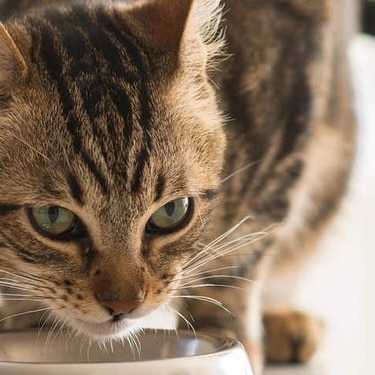
Discover what you can do to spot and support a sensitive cat stomach. See what routines and food you can implement to help your cat be happy and healthy.

Find out about how you can support your cat's digestion to boost overall health. Diet is key to a long and happy life for your cat, so discover what you can do.
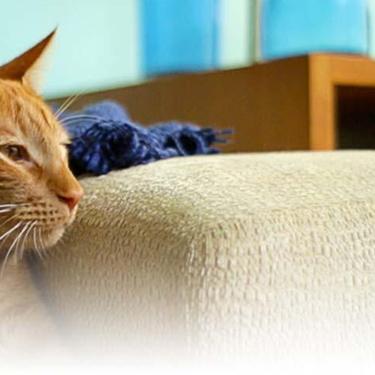
Find the right Hill
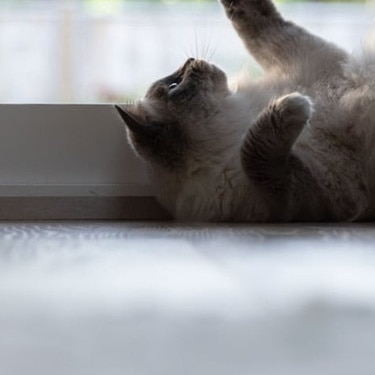
Feeding time can be a wonderful bonding opportunity for you and your cat. Find out how to make the most of it and create a healthy habit with HIll's Pet UK.

Put your cat on a diet without them knowing
Our low calorie formula helps you control your cat's weight. It's packed with high-quality protein for building lean muscles, and made with purposeful ingredients for a flavourful, nutritious meal. Clinically proven antioxidants, Vitamin C+E, help promote a healthy immune system.
Put your cat on a diet without them knowing
Our low calorie formula helps you control your cat's weight. It's packed with high-quality protein for building lean muscles, and made with purposeful ingredients for a flavourful, nutritious meal. Clinically proven antioxidants, Vitamin C+E, help promote a healthy immune system.

